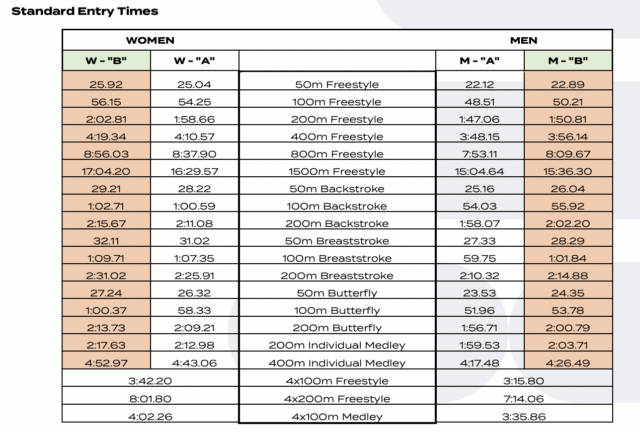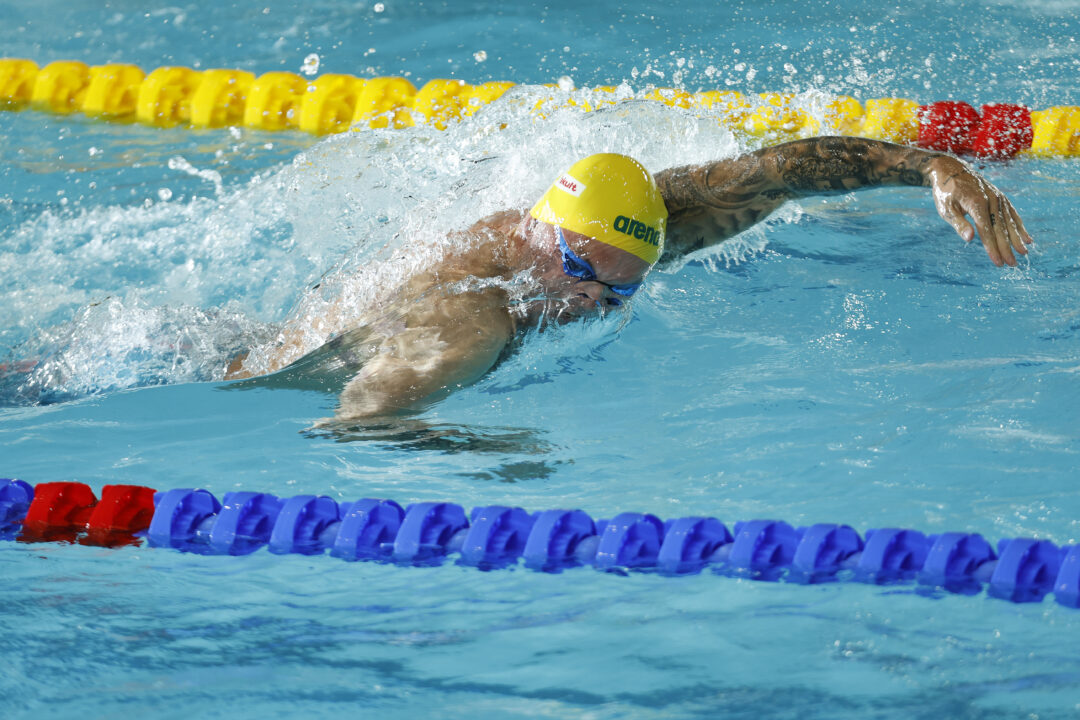While all eyes are on this year’s World Championships whose swimming competition begins in Fukuoka, Japan on July 22nd, World Aquatics has released the qualification procedures for the 2024 World Championships.
2024 World Aquatics Championships Qualification Criteria
Headed to Doha, Qatar, next year’s World Championships will see the swimming events span February 11th through February 18th.
The World Championships in Doha were originally slated to take place in November 2023—at the time the latest the event has ever been contested in the calendar year—but were pushed back to early 2024 after the 2022 championships in Fukuoka, Japan were postponed to 2023 due to COVID concerns.
World Aquatics (formerly FINA) then added the 2022 championships in Budapest, giving athletes three World Championship competitions in a tight 19-month window between Olympics.
Below are the official dates for each discipline Doha:

The qualification window for swimming spans October 1st of 2022 through December 19th of this year and the qualification standards for individual events are identical to those for the 2023 World Championships.
The ‘A’ standards were created using the faster of two times from the 2022 Budapest ‘A’ qualifying time standard and the 16th place time from the competition itself. The ‘B’ time standards were derived by multiplying the ‘A’ qualifying time standard by 3.5%.
The standard entry times for Relay Events are established based on the results from the World Championships Gwangju 2019, Olympic Games Tokyo 2020, and the World Championships Budapest 2022.

World Aquatics has slightly changed the method by which nations can qualify their relays for the 2024 World Championships. Federations can qualify relays in one of two ways:
- Via the current method of which forming a team of swimmers who have qualified for an individual event
- Via time standards for male and female relays that have been established for the following relay events: 4x100m Freestyle, 4x200m Freestyle, 4x100m Medley
Breaking the second method of qualification down further, federations are able to enter their qualified relay event and form a relay team irrespective of their athletes’ individual qualification times. Qualification via beating the time standards can come one of three ways:
- The current method of qualifying relays for World Championships (Competition Regulations (I. Rules Applicable to all Aquatics Disciplines, 6.2)
- Any swimmers entered in individual events even if they have not achieved a “A” or “B” Standard Entry Time for the corresponding stroke and distance of the relay in which they are entered.
- Additional swimmers as relay-only competitors provided that they have achieved the “B” Standard Entry Time for the corresponding stroke and distance of the relay in which they are entered.
- By recording a true relay time that is equal to or faster than the listed relay qualifying time standards; and/or
- By calculating an “add-up” time from four different swimmers from the same federation that is equal to or faster than the listed relay qualifying time standard(s) achieved at any of the qualifying events for World Championships Doha 2024.
Each Member Federation which qualifies for the relay events via any of the three methods above may have additional swimmers and mixed relays do not count toward the total number of relay quota.
- One (1) Relay: two (2) additional swimmers
- Two (2) Relays: four (4) additional swimmers
- Three (3) Relays: six (6) additional swimmers
- Four (4) Relays: eight (8) additional swimmers
- Five (5) Relays: ten (10) additional swimmers
- Six (6) Relays: twelve (12) additional swimmers

If I have a B cut what does this mean for me?
Given that you are an American, it means that you had a nice swim (congratulations), but the US selection procedures have a much higher bar than what is stated here.
The question for US swimmers is what will the selection process entail.
TYR Pro Series – Doha (International Edition)
These world champs will probably be the least attended/least significant to win in history. Especially with the location and how hot it is gonna be
So what? 30 years from now the winner’s metals will be just as shiny and nobody will remember the asterisk swim nerds put on this meet. If I was a pro I’d be champing at the bit to go to Doha.
For the US it’s gonna be awkward. Collegiate swimmers will be gearing up for conferences and ncaas. For pros everywhere in the world you will have to convince them to taper for worlds, and then for their selection meet, and then ultimately for the Olympics if the qualify. What top level contenders are going to throw that massive wrench into their plans? Younger guys might get the shout here.
A lot of the top college swimmers are taking a gap year anyway and a couple of the ones who aren’t, swim for a team that prides itself on being fast all the time. February is far enough out from US Olympic trials that they should be able to make it work. A world championship metal is a great achievement that would be the crowning moment of most swimmer’s careers. I don’t think opportunities like that should be squandered. Unless you’re someone like Ledecky or Phelps I don’t think you’re a big enough deal to just pooh-pooh a shot at the second biggest trophy in the entire sport.